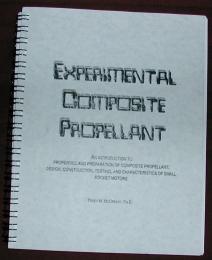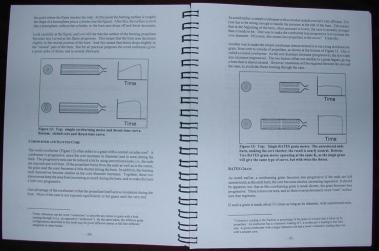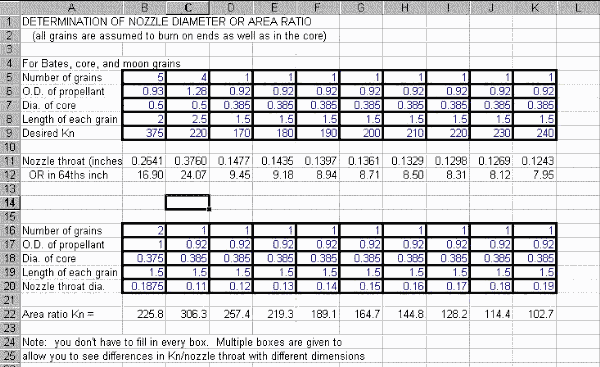Experimental Rocketry Group Experimental Composite Propellant Book/Magazine
Experimental Rocketry Group Experimental Composite Propellant
Contributed by Dick Stafford
| Overall Rating: | starstarstarstarstar |
Brief:
For some time, I've been interested in learning how to make composite motors and have heard many recommendations for 'Pr'fesser' Terry McCreary's book, "Experimental Composite Propellant." When I discovered that Aerocon distributes the book, I couldn't resist ordering a copy. I thoroughly enjoyed the book and it was worth the price just to learn more about those cool little things that I love to stuff into my rockets. This review provides an overview of the book rather than a technical critique, as I'm just a beginner in this field.
Overview:
The book is informally bound and self-published. It includes a 3 1/2" disk (Excel or Quattro Pro format) with the ProPel design spreadsheets (more about this later) and a nifty executable that provides a tutorial on how rocket motors work, called 'Motortut'. The other program referenced in the text, PropEP, is not provided, but there are references on where to get it online (it's also free).
This book falls somewhere between a cookbook, lecture notes, and a textbook. It is written in an easy to read, informal format and is non-technical. That is, the author provides just enough theory to let you know what you are doing and why. After some compulsory disclaimers, introductions and acknowledgements, he gets down to business. The first meaty section is entitled "Safety First" - a very prudent starting point. It includes dos and don'ts, and a proposed safety code. In the following section, he discusses the legality of propellant making. He presents guidelines to stay legal, making sure you realize that it is up to you to ensure your compliance with not only federal, but also state and local laws as well.
Next comes some background on composite propellant and a description of how a composite motor works. This is pretty basic stuff but is necessary for completeness. The Motortut program provides a nice graphical description of much of this material. Put this on a PC with a projector and you're ready to teach a scout troop about rocket motors.
 The subsequent sections provide some light theory, covering: motor thrust, specific impulse (Isp), total impulse, burn rate, chamber pressure, and burn profiles (neutral, progressive, and regressive). He defines the area ratio (Kn), which equals the area of burning propellant surface divided by the area of the nozzle throat. It turns out this parameter is directly related to chamber pressure and provides the basis for, among other things, the control of burn characteristics and the scaling of a motor design. He continues by describing different grain configurations (gee, I now understand what a Bates grain really is!) and nozzle design.
The subsequent sections provide some light theory, covering: motor thrust, specific impulse (Isp), total impulse, burn rate, chamber pressure, and burn profiles (neutral, progressive, and regressive). He defines the area ratio (Kn), which equals the area of burning propellant surface divided by the area of the nozzle throat. It turns out this parameter is directly related to chamber pressure and provides the basis for, among other things, the control of burn characteristics and the scaling of a motor design. He continues by describing different grain configurations (gee, I now understand what a Bates grain really is!) and nozzle design.
He then moves on to more hands-on stuff, describing in detail all the equipment and supplies you will need. These items are broken down into 'gotta have', 'nice to get later' and 'for vacuum processing' categories. This is followed by a simple propellant formula with a step-by-step, 'cookbook' process for making enough propellant for several G motors. One thing to note is that his propellant descriptions are based on using PBAN as the binder. I personally haven't formed an opinion about whether PBAN is better than HTPB, which in my limited perspective seems more commonly used. He does provide enough information to use HTPB, but it would take a tad more effort from the novice.
Being a scientist, the Pr'fesser stresses keeping a good lab notebook to keep track of your experiments. (We engineers like them too!) He has a section on troubleshooting, one on building static test motors, one on performing the static tests, and one on how to use the data from your tests to characterize your propellant.
Now the focus changes from motor building to motor design. He discusses design parameters and a design procedure. Several examples of adapting his basic propellant for different motor sizes are provided. Then, he discusses subjects like oxidizer particle size, the effects of metals, burn rate modifiers, etc. Several propellant variations are provided, along with their characterizations. Finally, he ends the main body of the book with a discussion of scaling.
But that's not it. Over half of the book's 243 pages are in the appendices.

The appendices include a description of the PropEP program and the author's ProPel notebook. In my case, the latter includes several spreadsheets within an Excel Workbook. I included a screen snap of one of the ProPel sheets, which allows you to compute either nozzle throat size or Kn given the grain dimensions. He continues with the plans for a curing oven, the use of coring rods, nozzle construction (here you really need machining skills), the design and construction of reloadable motors (ack, more machining), and scratch building igniters (I like both Igniterman and Magnelite). He goes on to give an overview of polymer chemistry, describing the reactions between binders, curatives, crosslinkers, bonding agents, catalysts, plasticizers, and surfactants. This all leads to a description and examples of curing calculations. Next are sections on mixing HTPB, how to do machine mixing (the basic procedure uses hand mixing), vacuum processing, building an instrumented thrust stand, and a description of the combustion process. There also is a lengthy vendor list (chemicals and equipment) and an annotated bibliography including both books and on-line resources. He concludes the book with a miscellaneous set of essays that he calls 'Sermonettes.' Well, I am worn out and leave it up to you to get the book and see what's in this final section.
Summary:
This is a fascinating book and I think most rocketeers would enjoy it, even if you do not plan to build motors. I have no doubt that I learned enough to make a composite motor. However, the book clearly taught me one thing that I had already suspected. That is, making motors can be *relatively* safe, but is by no means risk free. It is an activity that is not to be taken lightly and one does NOT want to cut corners, as your safety and the safety of others is at stake. And for now, I just don't have an adequate location to make them. Being new to this stuff, the only other thing I'd like to see in the book is expanded treatment of HTPB, including a cookbook example of a basic propellant (again, it seems that most people I'm familiar with use this binder), and some sample propellant formulations with their characterizations. Anyone with any experience will probably think this is too much spoon-feeding.
I rate this book a '5'. To quote the Pr'fesser, "more knowledge is almost always better."
Overall Rating: 5 out of 5
Sponsored Ads
 |
 |











